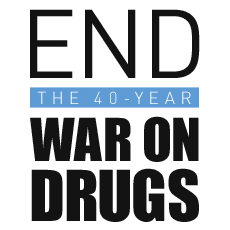
June 2011 marks the 40th anniversary of President Richard Nixon’s declaration of a “war on drugs” — a war that has cost roughly a trillion dollars, has produced little to no effect on the supply of or demand for drugs in the United States, and has contributed to making America the world’s largest incarcerator. Throughout the month, check back daily for posts about the drug war, its victims and what needs to be done to restore fairness and create effective policy.
If I had to pick a quote that guides the way I live my life, that’s the one.
I went to jail 14 times for being under the influence of a narcotic. Never for anything violent, and never for selling drugs, but that doesn’t mean my actions didn’t have consequences. I was addicted to cocaine and I knew that I was destroying my life; what I didn’t know was that I was affecting the lives of the people who loved and cared about me. It’s typical for an addict to say “It’s my life! I’m only hurting myself!” I also never made the connection between addiction and the serious childhood trauma of being tortured by my stepfather and molested by two different people.
The way we treat addicts in our criminal justice system is heartless and borders on the medieval. Instead of being seen as someone with a serious, recurring problem, I was seen, and treated, as a criminal. No one ever asked me, “Gee Dave, I see you’ve been to jail 12, 13, 14 times — do you think you have a problem? Why do you think you keep using drugs? Is there anything in your life you think you might be running away from?”
How much money was spent sending me to jail time and time again? I wonder if just a fraction of that time, money, and energy spent cycling me through the system could have been better directed towards getting me treatment. Finding out what was beneath the symptoms. Would things have ended up differently? Would I have stopped being a drain on the system, and on my family?
Beyond my own experience, there is a good deal of hard evidence that shows drug treatment is the key to rehabilitation, one that saves lives and dollars. Every person who recovers from addiction is one less person who will cycle in and out of prison. Right now in California, there are 8,500 people incarcerated for low level nonviolent drug offenses, at a cost to taxpayers of $442 million per year. Recidivism is an extremely expensive problem that we can solve.
After my 14th time in jail, I found a treatment center that offered group and individual therapy and it was there that I made the crucial connection between my addiction and my own childhood trauma. Untended wounds equal drug use; I learned that by acknowledging and treating my unaddressed pain, I could be in charge of my life, instead of being driven by my past. You can’t outrun yourself. After 12 months in this program, I am as emotionally and spiritually healthy as I’ve ever been. I just completed a full load at Berkeley City College, where I received all A’s. Last year my solo play, Cracked Clown, premiered at the prestigious Marsh Theater in San Francisco.
Going forward, I’d love to find work in public service, doing meaningful work for people who need assistance. Unfortunately, I’m having trouble finding work because of my record. But I’m going to keep trying. Currently, I’m spending my time speaking out against the war on drugs, and advocating for sentencing reform for low-level, nonviolent drug offenses.
In grade school, no one raises their hand and says “I want to be an addict when I grow up.” Treatment gives us a chance to connect the dots to what fuels our addiction. That gives us the opportunity to create a positive ripple effect, instead of causing collateral damage. My life has just begun.
Note: In California, the ACLU has launched a campaign to get elected officials to enact sentencing reform as they strive to resolve the state’s budget crisis and implement the Supreme Court’s decision in Brown v. Plata. Reducing the penalty for simple drug possession from a felony to a misdemeanor would free up hundreds of millions of dollars that could be redirected away from prisons into drug treatment and other alternatives to incarceration that are proven to work and help reduce the number of people who are sent to prison in California.
Learn more about the war on drugs: Sign up for breaking news alerts, follow us on Twitter, and like us on Facebook.


